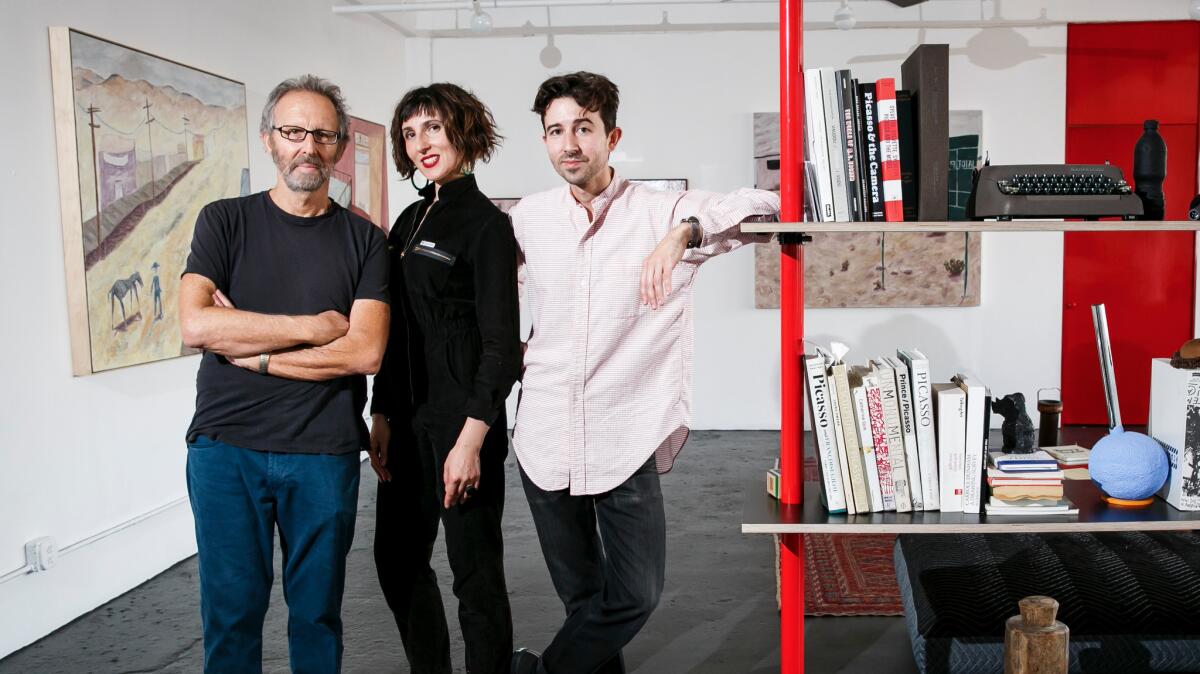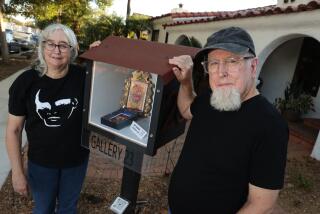The anti-mega gallery: The impromptu shows at Henry Taylor’s living room exhibition space
- Share via
Over the course of the last year, there have been plenty of splashy new gallery openings in downtown Los Angeles, including some whose exhibition halls can be measured by the acre. But the area isn’t just about monster commercial spaces. For the last nine months, painter Henry Taylor has been operating an intimate and informal exhibition hall in the living room of the apartment he has inhabited for 10 years.
Since January, the L.A. artist has hosted a series of small shows featuring work by himself and friends and collaborators, much of it orchestrated with the help of independent curator Yael Lipschutz (who helped organize the exhibition devoted to assemblage artist Noah Purifoy at the L.A. County Museum of Art last year).
Henry Taylor’s, as the space is called, isn’t intended to be a blockbuster Arts District mega space (though it is a stone’s throw from Hauser Wirth & Schimmel). Instead, it’s simply a spot for friends to gather and delve into projects old and new — with events promoted casually via Facebook.
“I was inspired by what Noah [Davis] was doing at the Underground Museum,” says Taylor, referring to the nonprofit arts space founded by the late painter in Arlington Heights. “It was about having conversations with artists, where people could relax and do things. That’s what this is.”
Lipschutz, who met Taylor through her work at the Noah Purifoy Foundation, where she is a trustee, says the exhibitions grew out of artist gatherings that were already taking place at Taylor’s apartment.
“He has always had nice get-togethers here,” she explains. “There is a good energy in this space.”

With a bit of design help from interior designer Jessica Ayromloo, he transformed upwards of 300 square feet of space in his apartment into a gallery.
The first show consisted of early pieces by Taylor himself. A well-known painter whose expressive portraits and sculptural installations reside in the collections of institutions such as the Museum of Contemporary Art in Los Angeles and the Museum of Modern Art in New York, among others, the artist is currently at work on a sprawling new exhibition at Blum & Poe in Culver City that opens this weekend.
“It was Henry’s earliest body of work, created when he was a psychiatric technician at Camarillo State Hospital,” says Lipschutz, referring to the paintings and drawings Taylor created in the 1980s and early ‘90s, before the artist had cemented his reputation as a painter. “I’ve been following Henry’s work for a long time, so it was great to be able to to see the early work.”
That show was followed by an exhibition of pieces by Detroit artist and curator Olayami Dabls. Lipschutz had been introduced to his work by a fellow independent curator, Corazon del Sol, who divides her time between L.A. and Detroit.
Dabls is best known for establishing the MBAD African Bead Museum in that city. He is also a painter, who over the course of his life has created entire series of works devoted to subjects such as civil rights and the American flag.
“I’d been looking at his work online,” says Lipschutz, “taking an abandoned city block and turning that into an installation that houses his African Bead Museum — with beads that date back to the 1700s. Plus, Detroit is such a historically important city. [Dabls] had never been to L.A. And we were able to show some of his earliest work.”
The exhibition that is currently on view also, to some degree, mines a curious corner of history.
The show, titled “Decimal & Zero,” features a series of paintings by Lipschutz’s father, Jeff Lipschutz, a painter who is preoccupied with the surreal qualities of landscape.
For this exhibition, he is displaying a series of surreal canvases from the 1980s devoted to a pair of characters of his own invention: Decimal and Zero, a man and a horse, who inhabit an abandoned desert town. The show is inspired by the painter’s own experiences growing up in Eagle Mountain, a mining town in the Mojave Desert that is now a ghost town.
“It’s not pretty, it’s not romantic,” says Jeff Lipschutz of the settings he is rendering. “It’s the kind of place that if the car breaks down, you think, ‘We are not getting out of here.’”
Also on view is a sculpture created by Lipschutz in collaboration with his son Michael (the pair make work together under the moniker Lipschutz & Lipschutz).
The next show at the gallery will consist of photography by Deana Lawson, an important new photographer who currently has a number of pieces on view at the Underground Museum as part of the group exhibition, “Non-Fiction”. (Note: Her images contain nudity.)
“She hasn’t had a solo L.A. show,” says Taylor. “So I’m very happy to have her here.”
But in keeping with the informality of the space, an opening date has yet to be set.
“We’re playing it instinctively,” says Yael Lipschutz. “It’s simply an opportunity to look at artists who may be underacknowledged.”
+++
Where: Henry Taylor’s, 810 E. 3rd St., downtown Los Angeles
When: The exhibition will be on view through Sept. 18. On Sept. 16 at 7 p.m., curator Philipp Kaiser will host a talk with artists Lipschutz & Lipschutz at the gallery.
How: Viewings are by appointment (email [email protected]) or during the gallery’s public events, announced via Facebook
Info: facebook.com/henrytaylorsgallery
Sign up for our weekly Essential Arts & Culture newsletter »

An exclusive clip of Doug Aitken’s “migration (empire)” as it will appear in MOCA’s the Geffen.
Find me on Twitter @cmonstah.
ALSO:
Why the Hammer Museum’s new free digital archives are a game changer
11 don’t-miss art exhibitions for fall: Quaytman, McLaughlin and a ‘Shimmer of Gold’
Doug Aitken to install ‘Underwater Pavilions’ this fall
More to Read
The biggest entertainment stories
Get our big stories about Hollywood, film, television, music, arts, culture and more right in your inbox as soon as they publish.
You may occasionally receive promotional content from the Los Angeles Times.











